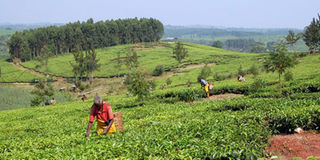Low global tea prices worry industry

Farmers harvest tea on a farm in Western Uganda. Tea is the most consumed beverage in the world. FILE PHOTO
What you need to know:
- Low global prices could push tea processors out of business, Dorothy Nakaweesi writes.
Low international tea prices amidst the high cost of production are threatening the growth of the tea industry in Uganda.
If this trend is not checked, the tea industry in Africa – Uganda inclusive, will end up collapsing.
These were concerns raised by the chairman of Uganda Tea Association (UTA), Mr Gregory Mugabe, during the just-concluded fourth African Tea Convention and Exhibition in Kampala.
Mr Mugabe said: “The industry is grappling with very low prices.
This is happening at a time when the cost of production is going up every year. We urgently need lasting and secure tea prices while satisfying consumer demand.”
The price of tea at the farm-gate is at its lowest trading at Shs300 per kilogramme of leaf, down from Shs550.
The industry is also faced with competition from other types of drinks mushrooming in the region.
Mugabe said unlike other regions, the consumption of tea in East Africa and Uganda in particular, is still very low.
“In Uganda on average, tea consumption is less than 5 per cent and the rest is exported. This means if you close the export market today, the following day the industry in Uganda will collapse,” Mugabe shared.
Tea is the most consumed beverage in the world. Uganda – the second largest tea producer in Africa after Kenya – has more than 20 tea producing companies.
With an annual foreign exchange return of $80 million (Shs297b), local tea growers have asked government to grant the sub-sector with $4 million (Shs14b) to shore up production and blending.
Way out
East African Tea Trade Association (EATTA)’s executive director Edward Mudibo said low global tea prices can be looked at with home grown solutions such as levies and exploiting the benefits of a common market and shared infrastructure.
“If all tea producing countries in the region removed VAT [Value Added Tax] on local leaf, it will increase the local consumption of teas and boost the market too,” Mudibo said.
He challenged African producers to start looking out for market diversification as a solution to volatile prices.
Mudibo added that the ongoing automation and upgrade of the Mombasa Auction which is expected to be complete at the end of the year, will simplify the auction process. This will increase volumes sold at the export market.
The EATT earlier this year received Ksh200 million (Shs7.4b) to upgrade the Mombasa Auction.
Despite currently being second largest black tea trade platform in the world, the Mombasa Tea Auction still relies on the ‘outcry’ method for placing and closing bids, which stakeholders say is inefficient and overtaken by events.
EATT has 190 members in 10 countries including Kenya, Uganda, Tanzania and Malawi among others.
The commodity sold through the auction is predominantly black CTC tea, but also orthodox and green tea.
According to the International Trade Centre, 55 per cent of tea sold in the world passes through the Mombasa auction.




